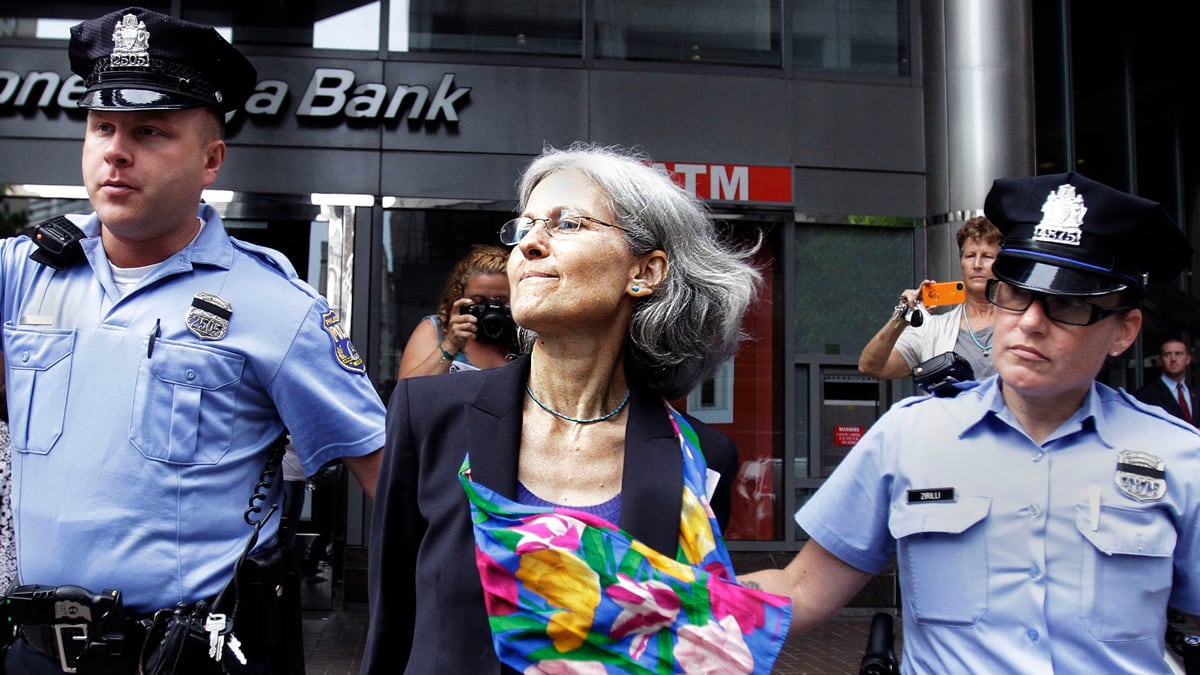Jill Stein walked into a bank in Philadelphia this week—and walked out in handcuffs.
Stein, a medical doctor, environmentalist, and onetime folksinger, was among five people, including an 82-year-old nun, arrested while protesting home foreclosures. She is also the Green Party’s nominee for president.

"We had a rally outside of Fannie Mae for two women fighting to stay in their homes," Stein says of the event that got her arrested for trespassing and jailed for nearly 24 hours, starting Wednesday afternoon. (When Stein and several others were denied entrance to the Fannie Mae office, they went to a next-door bank, sat down, and declined to leave.)
"These women are like the poster children for the injustice being heaped on American people," she says of the women trying to keep their homes. "One had been thrown out of her home and is living in her car with her daughter." Both women are "victims of predatory loans," she adds, "while Wall Street continues to make out like bandits."
Stein says her jail time was "like living in an outhouse in very close quarters." She stood up for nearly 24 hours, she says, as there was just one bench for the three people sharing her one-person cell. "The brave ones lay on the floor in front of the toilet," she says. Food consisted of white bread and processed cheese. "It was one of the most powerful events of my life," she tells The Daily Beast. "This should be a required experience for anyone in public office."
At the Green Party convention last month, the 62-year-old Stein beat out a big-name rival for her party’s nomination: comedian Roseanne Barr. Now, Stein says she has received enough donations to qualify for federal matching funds, a key indicator that she has raised national awareness. (The Federal Election Commission says it is currently reviewing the donations.)
The Greens hope Stein will reinvigorate the party, which suffered a reputation as a spoiler after the 2000 election, when its candidate, Ralph Nader, was seen as nabbing votes from Al Gore in Florida. Stein bested Barr for the nomination and racked up donations by crisscrossing the country, using her bedside manner to talk to young people in particular—meeting with college students and joining Occupy Wall Street protests. In a mock presidential election at Western Illinois University in November, she won 27 percent of the vote, while Barack Obama got 39 percent and Mitt Romney 33 percent. Stein showed up to campaign.
A Harvard-trained physician and married mother of two in Massachusetts, Stein is mainstream, sharp, and well spoken. She grew up in Chicago, where her parents were active in the civil-rights movement. She says her political awakening came after volunteering with an environmental group that advocated for warning labels and lists about the dangers of pollutants in the fish we eat. She says, laughing: “This is not what a sustainable planet looks like—you shouldn’t have to carry a list around with you.”
Along the way, she joined a local folk-rock band called Somebody’s Sister, singing about love and social themes. She ran with the Greens against Romney for governor of Massachusetts in 2002 and for the state House of Representatives in 2004. Then she was elected, twice, as a Town Meeting representative in Lexington, Mass., her only elective office. She says she is now on the presidential ballot in 24 states, a number she expects to get to around 40—about the same amount Nader got in 2000.
In some ways, Stein’s messages are Green Party perennials. Romney and Obama, she says, are both beholden to Wall Street, and the economy will never improve “as long as the predators are in charge of the chicken coop.” Rejecting money from corporations and political action committees, Stein expects to spend no more than $2 million on her campaign—an amount the headline candidates will drop on a television ad alone.
Her platform—the Green New Deal—argues for fixing the economy by cutting back on military spending and helping communities create “green” jobs, such as public transit, clean manufacturing, and affordable-housing construction. She’d like to ban assault weapons and legalize medical marijuana throughout the land.
Ralph Nader, the Green Party nominee in both 1996 and 2000, has publicly supported Stein, but sparked a little drama this past spring when he praised Justice Party candidate Rocky Anderson, leading that party to claim it was an official endorsement. Nader told us he doesn’t give endorsements, but rather that he says “nice things about good candidates.”
He believes a major challenge for Stein will be getting her message heard in the press, which furthers the “two-party tyranny,” he says. “The media cannot shake their indentured commitment to covering only the candidates they think have a chance to win. The press is boring us silly with its third-grade repetitious litany, day after day.”
The Stein camp had reached out to Roseanne Barr as a possible running mate, according to campaign manager Ben Manski, but she hadn’t expressed interest. When asked if Barr had called to congratulate Stein when she won the nomination, Manski said no. (Barr didn’t respond to a request for comment.)
Perhaps, in the end, that was a good thing. Stein’s running mate is an anti-poverty advocate and former homeless single mother named Cheri Honkala, and Stein sees the team’s outsider status as a plus. “There is zero possibility of our going to the dark side,” she says. “If you vote for either of the Wall Street–sponsored candidates, you are effectively giving them a mandate for four more years of Wall Street rule.”




